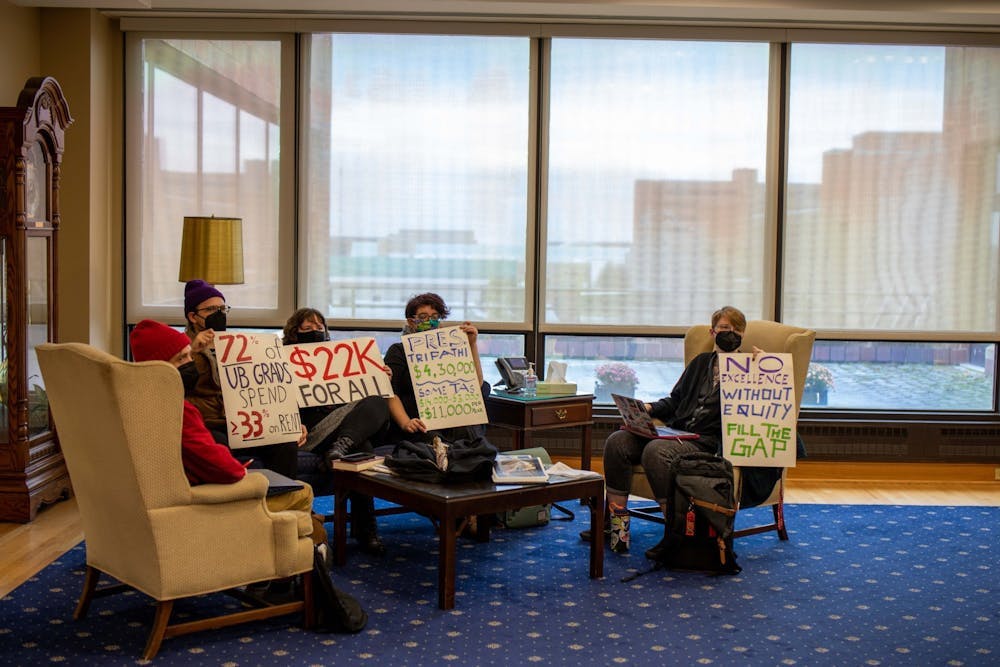Graduate student workers across the SUNY system celebrated last May when the New York State Legislature voted to include $3 million in the 2024 state budget to mitigate the broad-based fees paid by some graduate assistants (GAs) and teaching assistants (TAs).
UB was allocated $813,000 of that $3 million. But months later, not a single graduate worker has received any of that funding.
“Graduate workers are frustrated,” Lawrence Mullen, the business agent for the Graduate Student Employees Union (GSEU), the union that represents UB’s graduate workers, said.
“They’re frustrated that they spent four years advocating for this at the legislative level. We won it after four years of lobbying. And then, once this money actually gets put into the university’s hands, they seem unable to actually put it in the pockets of graduate workers.”
UB “is developing a plan” to retroactively fund broad-based fees for fall 2023 and spring 2024 semesters but “cannot commit to an exact date” for disbursement of funds, according to a university spokesperson.
“The university is currently working on confirming and operationalizing the disbursement plan and will communicate with graduate students once the disbursement plan and processes have been finalized,” the spokesperson said in an email to The Spectrum, adding that UB administrators “received notice of the funding” in the late fall.
Graduate workers in full-time, fully funded Ph.D. programs make minimum stipends of $23,000 and have their broad-based fees paid for by the university, so Mullen says they’ve been asking UB administrators to use the state funding to subsidize fees for non-doctoral graduate workers and graduate students working outside of their academic department. Those workers, who make up 25-33% of the 1,100 GSEU employees at UB, make annual stipends that can be as low as $12,000 and then pay broad-based fees of $1,539 per semester.
But after months of contentious back-and-forth with UB’s Employee Relations office that didn’t result in any promises, Mullen is afraid that the university will use the state funds to “pay themselves back” for the graduate worker broad-based fees they’ve already funded.
“The point of this money was to go towards fees, not to pay yourselves back first,” Mullen said. “Is it technically using the money for fees? Yes. Is it an inequitable use of that money? Absolutely.”
The UB spokesperson said that state funding “is intended to cover the fee costs for all graduate students with university assistantships (TA, GA or RA), including masters, professional and part-time graduate students, whose mandatory broad-based fees aren’t already funded by the university.”
The university spokesperson called the money “a one-time, non-recurring investment from SUNY,” but state funding may very well go to fee mitigation for years to come.
The $3 million provided for mitigating graduate student fees is ongoing in the state’s financial plan, according to a SUNY spokesperson, but additional funds would have to be allocated by the New York State Legislature.
A spokesperson for State Assemblymember and Committee on Higher Education Chair Patricia Fahy, who was instrumental in efforts to include graduate worker fee mitigation in the budget, said that legislators have — “at the very least” — an informal agreement to keep funding fee mitigation.
“Last year was the start of addressing the fees,” the spokesperson for Assemblymember Fahy said of the agreement. “And every year moving forward, we’re going to continue to address them in a bigger and bigger way, with more and more funding.”
Mullen says continued funding for fee mitigation is crucial to improving the quality of life for graduate workers.
“This is real people’s lives,” Mullen said. “It’s not like putting up a new building or another cafeteria that’s over budget. This is literally someone paying their rent. This is someone having money saved for the summer, because we’re not employed over the summer. There are real consequences to this.”
Grant Ashley is the editor in chief and can be reached at grant.ashley@ubspectrum.com

Grant Ashley is the editor in chief of The Spectrum. He's also reported for NPR, WBFO, WIVB and The Buffalo News. He enjoys taking long bike rides, baking with his parents’ ingredients and recreating Bob Ross paintings in crayon. He can be found on the platform formerly known as Twitter at @Grantrashley.





